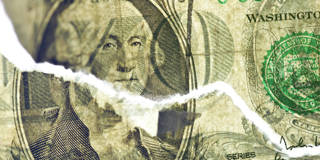Despite its current challenges, the US dollar’s status as the world’s main reserve currency remains integral to the multilateral trade system as we know it. While there are currently no viable alternatives that could usurp the greenback, the biggest threat to its hegemony comes from the US government itself.
NEW YORK – At the end of World War II, the United States accounted for more than half the world’s economic output and gold reserves. The United Kingdom was effectively bankrupt, with the remnants of the sterling area bound together by capital and trade controls. Once the British pound became convertible in July 1947, owing to US insistence, it succumbed to overwhelming selling pressure. The dollar, which was pegged to gold at $35 an ounce, was buoyed by America’s privileged position within the newly formed International Monetary Fund and quickly established itself as the bedrock of global trade and finance.
While the US today accounts for only 25% of global output, the dollar remains involved in nearly 90% of all foreign-exchange transactions. Despite its central role in cross-border trade and borrowing, however, the greenback’s share of central-bank foreign-exchange reserves has fallen from 72% in 2000 to 59% today. Given recent harsh criticism of US currency policy by officials in China, Russia, Brazil, Saudi Arabia, and elsewhere, it may therefore appear that the dollar’s uncontested reign is coming to an end, with far-reaching global economic consequences.
Importantly, the biggest threat to the dollar’s dominance comes not from competitive alternatives, but from the US government itself. The recent standoff over the federal debt ceiling, which threatened to trigger global financial instability, is a case in point. The prospect of endless repetition of such reckless partisan conflict prompted Fitch Ratings to downgrade the country’s credit rating from AAA to AA+, highlighting doubts about whether global investors can continue to trust the “full faith and credit of the US government.”

NEW YORK – At the end of World War II, the United States accounted for more than half the world’s economic output and gold reserves. The United Kingdom was effectively bankrupt, with the remnants of the sterling area bound together by capital and trade controls. Once the British pound became convertible in July 1947, owing to US insistence, it succumbed to overwhelming selling pressure. The dollar, which was pegged to gold at $35 an ounce, was buoyed by America’s privileged position within the newly formed International Monetary Fund and quickly established itself as the bedrock of global trade and finance.
While the US today accounts for only 25% of global output, the dollar remains involved in nearly 90% of all foreign-exchange transactions. Despite its central role in cross-border trade and borrowing, however, the greenback’s share of central-bank foreign-exchange reserves has fallen from 72% in 2000 to 59% today. Given recent harsh criticism of US currency policy by officials in China, Russia, Brazil, Saudi Arabia, and elsewhere, it may therefore appear that the dollar’s uncontested reign is coming to an end, with far-reaching global economic consequences.
Importantly, the biggest threat to the dollar’s dominance comes not from competitive alternatives, but from the US government itself. The recent standoff over the federal debt ceiling, which threatened to trigger global financial instability, is a case in point. The prospect of endless repetition of such reckless partisan conflict prompted Fitch Ratings to downgrade the country’s credit rating from AAA to AA+, highlighting doubts about whether global investors can continue to trust the “full faith and credit of the US government.”